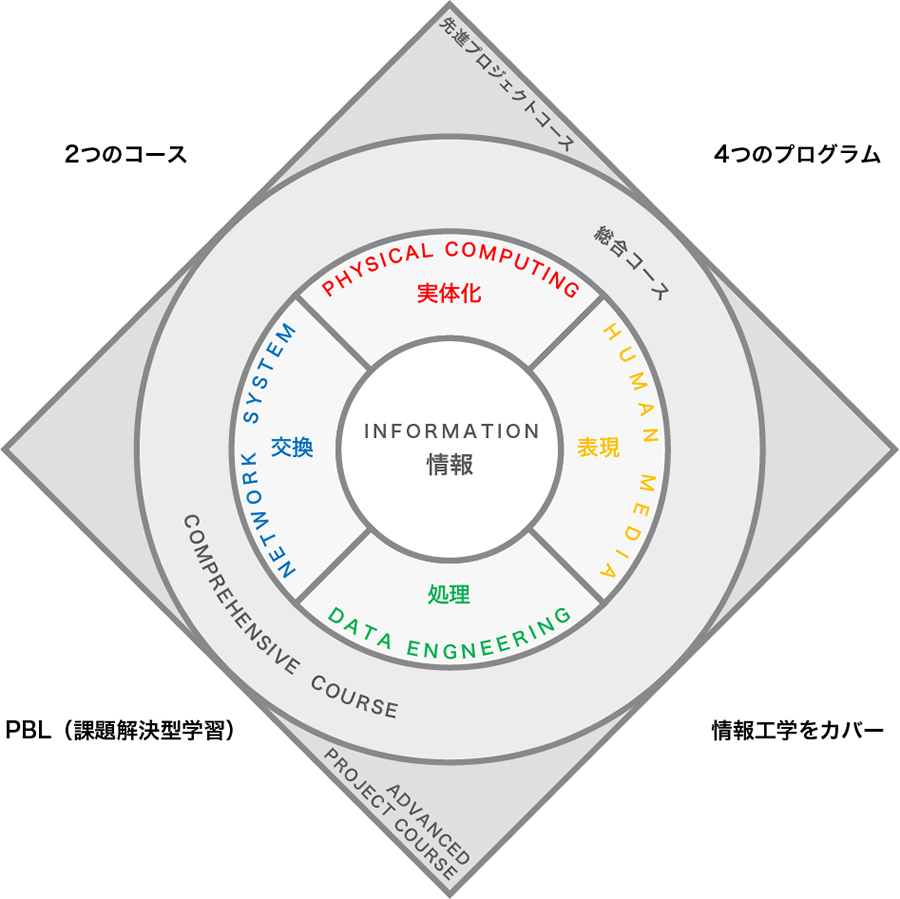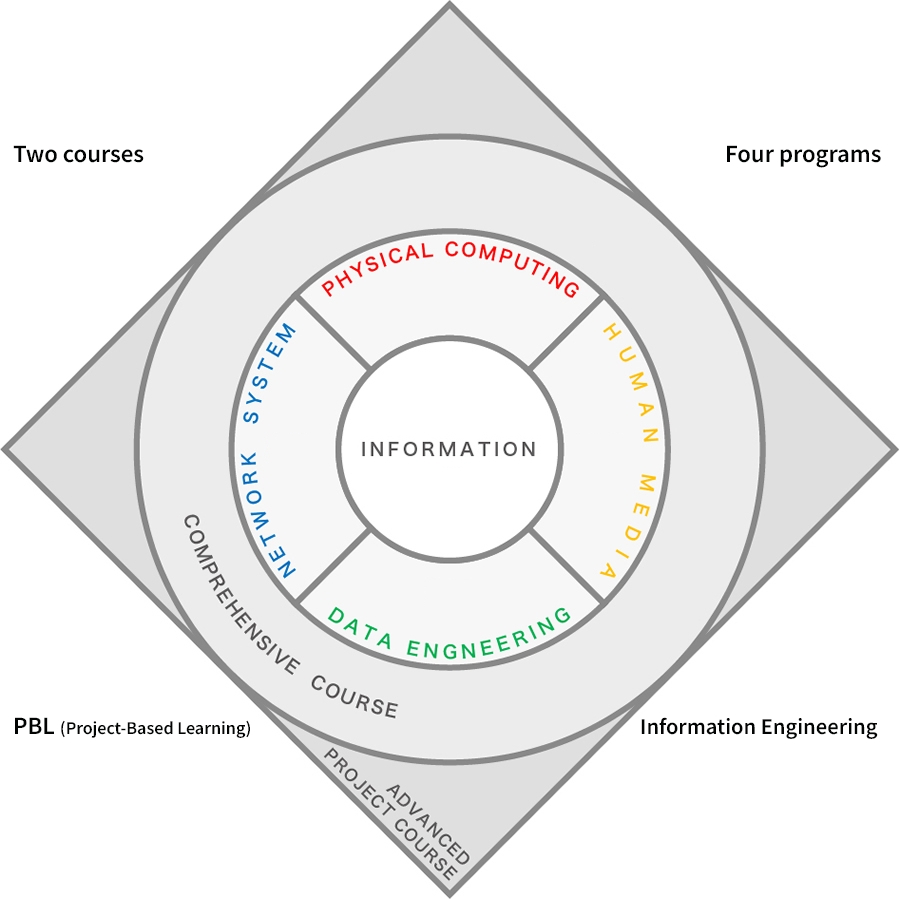Here we introduce the background of the establishment of the Faculty of Information Engineering and the characteristics of its studies.
Cultivation of individuals with practical technologies
At Meijo University, the Department of Information Science was established in 2000 as part of the Faculty of Science and Technology. It evolved into the Faculty of Information Engineering in 2004, focusing on educating and researching to develop information technology professionals. Then, in 2022, in response to societal demands, the Faculty of Information Engineering was launched as the tenth faculty of Meijo University.
In recent years, driven by the push for Digital Transformation (DX), IT has penetrated various sectors, leading to substantial societal shifts towards digitalization. Information technology has become indispensable for solving problems across a broad spectrum of fields including finance, manufacturing, healthcare, agriculture, and management. This has made the cultivation of skilled professionals a critical need. Consequently, the ‘next-generation DX talents’ required for this transformation must possess a comprehensive set of abilities: they need collaboration skills to work with individuals from various fields, technical skills to effectively utilize information technology, and practical skills to solve complex problems.
To cultivate these skills, the Faculty of Information Engineering at Meijo University has implemented Project-Based Learning (PBL). This program allows students to gain experience by collaboratively solving real-world problems from various fields. In PBL, students partner with companies and organizations that are addressing cutting-edge challenges, learning how to turn their ideas into reality. This approach requires students to use the latest development tools, collaborate in teams, generate ideas, and develop the necessary skills to bring these ideas to fruition.
To this end, we have significantly revamped our curriculum. Previously, the emphasis was on learning systematically from basic to advanced levels in a structured order. The new curriculum prioritizes experiential learning, where students build and create in response to real-world challenges. This hands-on approach not only makes learning enjoyable but also integrates systematic study to deepen understanding of the underlying mechanisms as students work to improve their projects.
At the Faculty of Information Engineering at Meijo University, we offer two courses that balance systematic and experiential learning. The Comprehensive Course emphasizes systematic learning, while the Advanced Project Course focuses more on experiential learning, deepening knowledge through collaboration with external partners and specific projects.
Furthermore, the broad field of information engineering at Meijo University is covered through four programs: Physical Computing, Data Engineering, Human Media, and Network Systems. These programs are designed to allow students to tailor their learning to their individual goals and interests. It is possible to choose multiple programs. By combining the two courses and four programs, we fully support students in growing beyond their expectations through practical encounters with companies and organizations, ultimately helping them become valuable contributors to society.
Introduction Movie from Dean(13’19”)
Education Concept Diagram
At the Faculty of Information Engineering at Meijo University, we focus on ‘information’ and explore four key areas: Physical Computing—materializing information; Data Engineering—processing information; Human Media—representing information; and Network Systems—exchanging information. By integrating these technologies, we deepen our practical experience through Project-Based Learning (PBL), which involves tackling real-world challenges.
Distinctive Features of Learning
Feature 1Diverse Learning through a Combination of Courses and Programs
Students can tailor their education according to their individual interests, aptitudes, and future aspirations. Through the choice between the ‘Comprehensive Course’ and the ‘Advanced Project Course,’ which cater to different orientations, and the learning offered by the four programs spanning the broad field of information engineering, students can explore their interests, discover their aptitudes, and seek future career paths that align with their unique personalities.
Feature 2Rooted in the Engineering Mindset of Creation and Innovation
The ‘Comprehensive Course’ inherits the DNA of the Faculty of Science and Engineering, where Nobel laureates in the research of blue LEDs (2014) and lithium-ion batteries (2019) have been members. The educational foundation is rooted in the spirit of ‘creative practical learning.’ Many faculty members have extensive practical experience from top institutions such as the Toyota Central Research Institute, RIKEN, ATR, NTT, and Hitachi. While being mindful of real-world applications, students are encouraged to challenge themselves with high-level research under the guidance of experienced faculty members
Feature 3Implementation of Project-Based Learning (PBL) Designed for Real-World Applications
In the ‘Advanced Project Course,’ students adopt a hands-on learning style by spending several months in teams tackling complex societal issues through development projects. The course includes opportunities for hands-on seminars and workshops led by actively working information engineers in the industry, as well as participation in hackathons where students collaborate with others to develop programs and design services within a limited time frame.
Feature 4Unique Interfaculty Collaboration and Diverse Support Offered by a Comprehensive University
Leveraging the strengths of a comprehensive university with ten faculties in both arts and sciences, we aim to solve a wide range of interdisciplinary themes through collaboration with other faculties. Additionally, the breadth of learning is expanded by integrating support systems for extracurricular activities with regular academic courses. For example, the ‘Enjoy Learning Project’ allows students to tackle social issues by gathering peers and obtaining grants, while the ‘Challenge Support Program’ offers leadership training and opportunities to apply these skills abroad.
Feature 5Community Engagement Supported by a 100-Year History and Location in Aichi
Our university, which will soon celebrate its 100th anniversary, has a history and tradition that have fostered trust in the community and society. Located in Aichi Prefecture, a region known for its thriving industries, we have numerous collaborations in research and education with various companies and local governments. This provides substantial support for internships and employment opportunities. With 200,000 alumni active both domestically and internationally, our students can draw on a diverse range of role models to shape their career visions.
“Innovation Hub,” a research facility for collaboratation with local communities
In Research and Experiment Building III, which serves as a base for the Faculty of Information Engineering at Meijo University, there is a multipurpose creative space called the ‘Innovation Hub.’ Here, students generate ideas through discussions with peers both within and outside the university, utilizing the power of ICT to create new products and concepts. The Innovation Hub not only supports projects from the Faculty of Information Engineering but also facilitates cross-faculty projects involving students from various faculties, as well as events and collaborative research with companies. It truly acts as a hub that transcends internal and external boundaries to foster innovation. The space is equipped with Wi-Fi, mobile tables, whiteboards, and eight screens to support student development.



